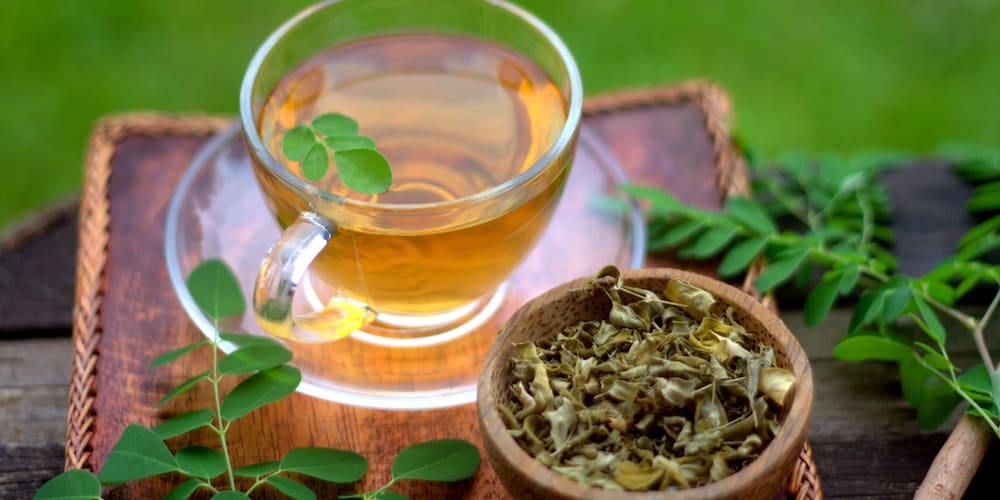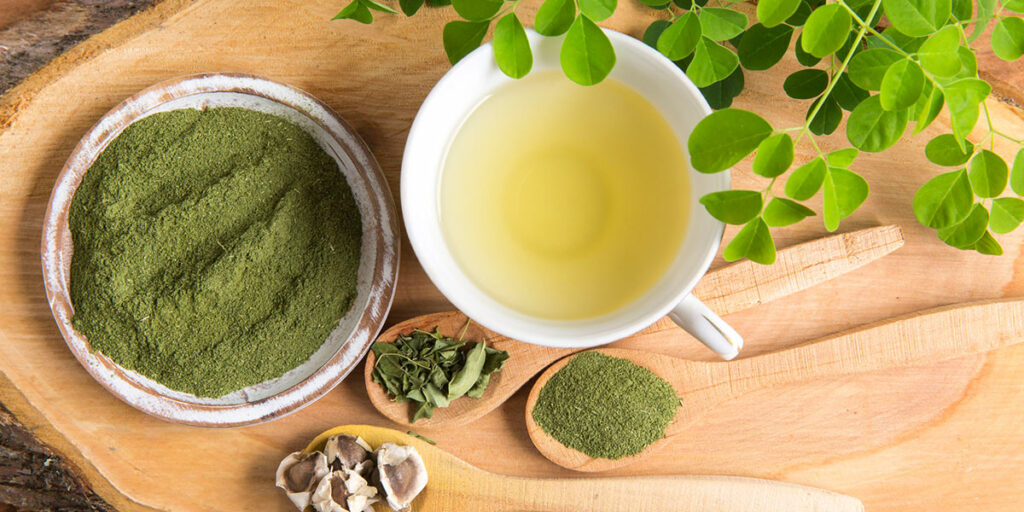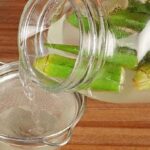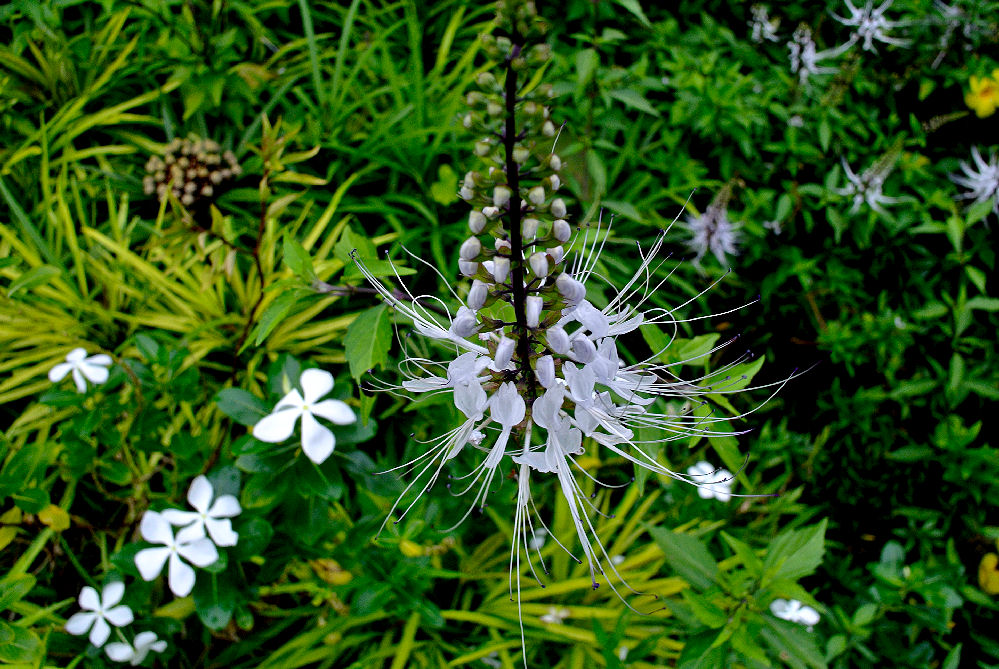Side Effects of Drinking Moringa Tea
Before we delve into the side effects of drinking moringa tea, it is noteworthy how numerous individuals grappling with cancer often explore the realm of herbal medicine as a supplementary approach, often spurred by anecdotal accounts of miraculous cancer recoveries circulating online.
One such botanical contender in the spotlight is the moringa tree, purportedly endowed with cancer-preventive and curative properties.
Scientific inquiry has delved into the potential of moringa as a therapeutic agent not only for cancer but also for a spectrum of maladies including asthma, cardiovascular ailments, and diabetes.
Originating in India, moringa has proliferated globally, flourishing in tropical and subtropical climates. The moringa genus encompasses a diverse array of species, ranging from modest leafy shrubs to towering arboreal forms.
Among these, Moringa oleifera, a nimble-growing tree, stands as the most harvested variety.
While investigations into moringa’s anti-cancer properties have yielded promising results in laboratory settings and rodent models, human clinical trials remain scarce.
Preliminary studies suggest that moringa extracts possess the capability to dismantle various cancer cell types, yet these findings await validation in human subjects.
Notably, there exists a conspicuous absence of research concerning moringa’s impact on mesothelioma, leaving a significant gap in our understanding of its efficacy against this specific cancer type.
Basic Side Effects of Drinking Moringa Tea
Moringa, often hailed as a nutritional powerhouse, has garnered attention for its purported health benefits. However, alongside its positive attributes, it’s crucial to delve into the potential side effects that may arise from consuming this botanical wonder.
- Blood Pressure and Heart Rate Effects: Alkaloids present in moringa have been associated with alterations in blood pressure and heart rate. While this may be advantageous for individuals seeking to regulate hypertension, it poses a potential risk for those with existing cardiovascular conditions or who are on medications affecting heart function.
- Uterine Contractions: Particularly concerning for pregnant individuals, moringa bark has been linked to uterine contractions. This could potentially lead to complications during pregnancy, emphasizing the importance of caution and avoidance of moringa consumption in expectant mothers.
- Cell Mutations: Research suggests that certain compounds isolated from roasted moringa seeds may induce cell mutations. While the extent of this effect and its implications for human health remain unclear, it underscores the necessity for further investigation into the safety of moringa consumption, particularly in its processed forms.
- Interference with Fertility: Limited evidence hints at a potential interference of moringa with fertility. This raises concerns, especially for individuals attempting to conceive, and underscores the importance of thorough research and consultation with healthcare professionals before incorporating moringa into one’s diet.
- Gastrointestinal Distress: Moringa’s laxative properties may result in gastrointestinal discomfort, including upset stomach, gas, or diarrhea. While these effects may be mild and transient for some, they can significantly impact others’ digestive health and overall well-being.
- Liver and Kidney Damage: Animal studies have suggested a possible risk of liver and kidney damage associated with moringa leaf consumption. Although findings from animal studies may not directly translate to humans, they serve as a cautionary reminder of the need for prudence when consuming moringa, especially in large quantities or over extended periods.
Furthermore, specific populations, such as pregnant individuals or those taking certain medications like Januvia or drugs metabolized by the cytochrome P450 enzyme family, should exercise particular caution or avoid moringa altogether due to potential interactions or adverse effects.
In light of these considerations, while moringa holds promise as a nutritional supplement, it is essential to approach its consumption judiciously.
Consulting with healthcare professionals, especially for individuals with pre-existing health conditions or those taking medications, can help mitigate potential risks and maximize the benefits of incorporating moringa into one’s diet safely.
YOU MAY LIKE: Benefits of Drinking Okra Water
Navigating Moringa’s Safety and Side Effects: A Comprehensive Overview
Moringa, celebrated for its culinary and medicinal virtues, offers a spectrum of benefits alongside potential side effects. Understanding the safety profile of each part of the moringa plant is crucial for informed consumption:
Moringa Leaf:
- Safety Profile: Widely regarded as the safest and most extensively researched component of the moringa oleifera plant.
- Known Side Effects: Virtually none when consumed within recommended doses.
- Overconsumption Risk: Highly improbable due to the need for substantial quantities (about three grams per pound of body weight) to elicit adverse effects.
- Nutritional Powerhouse: Rich in nutrients and antioxidants, making it a valuable dietary addition.
Moringa Leaf Powder:
- Safety Profile: Derived from grinding moringa leaves into powder form, mirroring the safety of the leaf itself.
- Reported Side Effects: Minimal, with occasional instances of mild digestive discomfort in sensitive individuals.
- Potential Interactions: May interact with certain medications, necessitating caution, particularly for individuals on diabetes, thyroid, or blood pressure drugs.
Moringa Root and Seed:
- Safety Concerns: Less researched and potentially riskier compared to the leaf.
- Toxic Properties: Moringa roots, in particular, may harbor toxic compounds, warranting cautious consumption.
- Recommended Dosage: Adhere strictly to recommended dosages to mitigate risks of toxicity and cellular damage.
Overall Safety Perspective:
- Dose-Dependent Effects: The safety of moringa hinges on the part of the plant consumed and the dosage administered.
- Rare Side Effects: Adverse effects are infrequent, especially when adhering to clinically recommended doses.
- Consultation is Key: Consultation with healthcare professionals is advised before incorporating moringa into one’s regimen, especially for individuals with pre-existing medical conditions or those on medications.
- Vigilance and Responsiveness: Prompt cessation of moringa consumption and medical consultation are recommended upon experiencing adverse reactions.
In essence, while moringa leaf and leaf powder stand out as safe and nutritionally robust options, prudence is paramount when considering the roots and seeds.
With careful adherence to recommended dosages and vigilant monitoring of individual responses, moringa can be embraced as a beneficial dietary supplement with minimal risk of side effects.

Exploring the Nutritional Benefits and Potential Uses of Moringa
Moringa, dubbed the “miracle tree,” boasts an impressive nutritional profile, making it a noteworthy addition to dietary regimens worldwide. Let’s delve into its nutritional values and potential applications:
Nutrient Content:
- A cup of chopped moringa tree leaves, as per the 2018 National Nutrient Database for Standard Reference, provides a substantial nutrient boost:
-
- 2 grams of protein
- 11% of the Recommended Dietary Allowance (RDA) of iron
- 9% of the RDA of vitamin A
- 12% of the RDA of vitamin C
Antioxidant Properties:
- Vitamins C and A, potent antioxidants abundant in moringa, play pivotal roles in combating cell damage induced by free radicals, which are implicated in cancer development.
- Vitamin C supports immune health, bolstering the body’s defenses, while vitamin A maintains mucous membranes, crucial for warding off infections in the respiratory and digestive tracts.
Immune-Boosting Amino Acids:
- Moringa leaves harbor amino acids with potential immune-boosting properties. While research in this domain remains limited, the prospect of fortifying immune function, particularly in patients undergoing treatments like chemotherapy, warrants further exploration.
Exceptional Nutrient Density:
- The Nutritive Value of Indian Foods showcases the remarkable nutritional potency of moringa leaves:
-
- Seven times the vitamin C content of an orange
- Three times the iron content of spinach
- Four times the vitamin A content of a carrot
- Four times the calcium content of a glass of milk
- Three times the potassium content of a banana
- Twice the protein content of plain yogurt
Versatile Culinary Uses:
- Moringa leaves offer culinary versatility, suitable for consumption in various forms:
-
- Fresh, cooked, or crushed
- Dried and powdered, retaining nutritional integrity for extended periods
- Incorporate moringa into your diet by:
-
- Blending into fruit smoothies for a nutritious kick
- Substituting for spinach in recipes to elevate nutritional content
- Adding dried powder to curry dishes, enhancing flavor and nutrient density
Herbal Medicine Potential:
- Ethnobotanical records attest to moringa’s historical use in herbal medicine, addressing diverse symptoms, including those associated with conditions like mesothelioma.
- While preliminary evidence suggests potential benefits, comprehensive scientific research and clinical trials are imperative to ascertain moringa’s efficacy in cancer prevention and treatment.
Precautions and Consultation:
- Given the variability in individual responses to cancer treatments and complementary therapies, it’s prudent to consult healthcare professionals before integrating moringa into treatment regimens or diets.
- Vigilance is essential for monitoring potential side effects, warranting prompt medical attention if encountered.
In essence, regarding the sides effects of drinking moringa tea, while moringa holds promise as a nutritional powerhouse and complementary therapy, rigorous research is indispensable to unlock its full potential in cancer management.
Proceeding with informed caution and medical guidance ensures safe and optimal utilization of this remarkable botanical resource.

A graduate of Computer Science and Information Management Technology. Diploma – Caregiving, Certificates – Dementia and Diabetes Awareness and Management. A researcher, blogger, songwriter, singer and acoustic guitarist. Born in an environment where natural talents such as healing are imparted at our natural birth. This natural talents of healing is the result of our genetic inheritance and the training from family environment.












